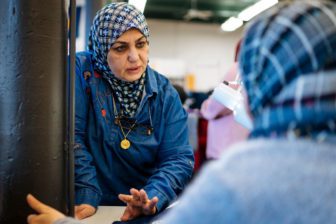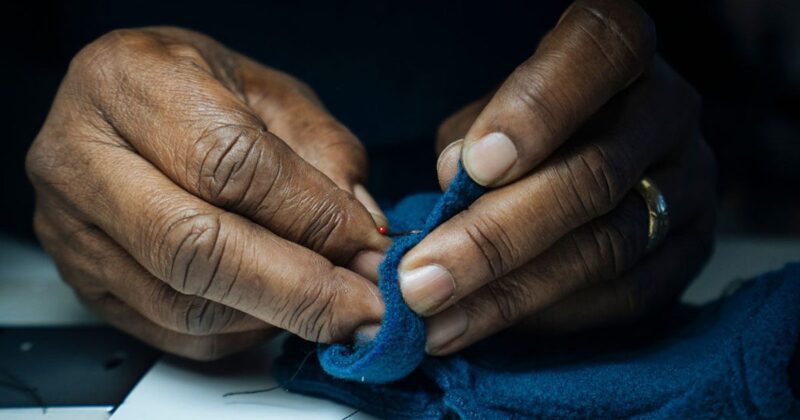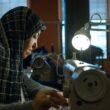WESTBROOK — On the top floor of the sprawling Dana Warp Mill, rows of American Roots stitchers carefully assemble an order of fleece jackets. Operating the humming machines is a workforce of immigrants from Iraq, Ethiopia, Egypt, Democratic Republic of Congo, Angola, Morocco and Cambodia who are an integral part of the company’s success.
Mostly women, they labor in the light of towering windows overlooking the Presumpscot River, which powered a booming textile industry in the late 19th and early 20th centuries when city mills employed hundreds of workers, many of them immigrants – French speakers with roots in Quebec.
Today, Dana Warp Mill – housing diverse businesses that range from a dance studio to a financial service business – is home to a company that brings it full circle. Co-founded in 2015 by husband and wife Ben Waxman and Whitney Reynolds, American Roots employs a skilled group of immigrants who make jackets, pullovers, hoodies, scarves, hats and more.
As the mill’s largest tenant, American Roots employs 24 people and plans to have a workforce of 28 in the third quarter of this year, says Waxman. The company provides benefits, including paid sick days and a 401(k) plan. It’s a union shop that makes products from U.S.-made materials. Clients include corporations and labor organizations – no surprise since Waxman worked for the AFL-CIO in Washington, D.C. before returning to his home state.
READ THE SERIES Help Wanted: The Immigrant Opportunity
American Roots, which had more than $1.4 million in sales in 2018 and plans to increase capacity by 40 percent later this year, has thrived, in part, because of its predominantly immigrant workforce – only five of its workers are “native” Mainers.
“Without this immigrant workforce, there is no company. There’s no revenue,” says Waxman.

Playing a key role in that success is Portland’s Anaam Jabbir, a refugee from Iraq who was one of the company’s first employees. She’s now head stitcher, union president and a U.S. citizen.
“It was so hard to find a job,” says Jabbir, who was a teacher in Iraq. “I applied for 40 to 50 jobs, but there was nothing. Before, people weren’t so accepting of immigrants, and there wasn’t so much help with adult education and career centers. Here, I have made the most of my chance to develop new skills and to advance.”
Waxman, who grew up in a family that worked with textiles, is clear that employing immigrants was not a focus of his original business plan. The makeup of his workforce is a result of two needs: skilled stitchers that Maine’s traditional workforce couldn’t supply in sufficient numbers and a population hungry for employment.
“We needed a training program,” Waxman says. “We thought we could just go out and hire Mainers, but there just weren’t Mainers who could sew at the level that we needed.”
Waxman stresses that the program is open to everyone and that it’s not just for immigrants. However, interest from U.S.-born Mainers has been minimal.
“If you want to work, we’ll hire you,” he says. “Through Portland Adult Ed, 32 people applied to the training program, including two ‘native Mainers.’ Of the two, one didn’t show up for an interview twice, and the other didn’t want to do paid training.”
Step one was the creation of a training program, and Waxman turned to his mother for help. Dory Waxman, a former Portland city councilor and owner of Old Port Wool and Textile Co., put her deep experience with fabric to work in 2015 to create the free Old Port Wool & Textile School for Professional Stitchers with the support of Goodwill, Coastal Enterprises, Inc., and Portland Adult Education. Thanks to posters at Adult Ed in Portland and word of mouth in the immigrant community, her first class filled quickly.
Students, who range from neophytes to experienced sewers, learn the art of professional sewing as well as work-specific English skills in the training program, now called Common Threads. Basic English skills are required for acceptance into the program.
Seventy-four stitchers have completed the 16-week program. Of those, seven aren’t working in Maine, and the school has lost contact with four other students. Students attend classes five days a week, and graduates are working for various local textile companies, including angelrox and Hyperlite Mountain Gear in Biddeford and Sea Bags Maine in Portland.
“We can’t train them fast enough,” says Dory Waxman. “We get a lot of applicants from word of mouth and from Portland Adult Education. Besides sewing skills, we teach the rules of going to work, we go over job applications and start prepping them for employers.”
She has relied on small grants and self-funding to keep the school afloat, which is a challenge: “We are sustaining this on a minimal amount of money. We are always robbing Peter to pay Paul.”
To supplement Common Threads training, American Roots has developed an apprenticeship program with the City of Westbrook, which is paying 65 percent of costs to employ 10 apprentices at the company. The city’s share of the cost is around $73,000. The company has hired four employees through the program and plans to add more in the third quarter of this year.
In the midst of a frustrating job search after working in housekeeping and at a family restaurant, Jabbir made the connection to the training program after seeing a poster at Portland Adult Ed.
“My skills have grown here,” she says. “I like working with these people. There are many immigrants here from many countries, and we learn from them and they learn from us.”
Based on her experience, Jabbir offers the following advice to Maine employers: “I encourage them to work with immigrants to give them a chance. Some of them have degrees, experience. Let them have a chance. I think most of them are good workers. And they need to work hard to support their families.”
Jabbir and her family moved to Maine a decade ago from Atlanta.
“We came in July 2008 to Atlanta in the refugee program, but I had a friend in Maine who said this is a good place for raising a family,” she says. “We heard that Maine is safe for families and that there are good schools. We heard the elementary, middle and high schools were good and that the teachers are good, and we knew that general assistance is good here. Then we decided – my two boys and girl and my husband – to move to Maine in 2009.”
In the years that have followed, she became a citizen, and her children have attended the University of Southern Maine.
Ben Waxman is well aware of the significance of immigrants working in the old mill located at the edge of Westbrook’s Frenchtown neighborhood, an area that once provided much of the labor for the city’s mills.
“I think about it every day when I walk up these steps,” he says.
There has been a cultural learning curve for both Waxman and his employees. He has learned that patience is vital. Because many refugees and asylees have suffered trauma, building trust can take time.
Waxman also recognizes that his employees view their workplace and co-workers differently than U.S.-born workers do. For example, he has learned that employees may need a brief chance to catch up with colleagues before diving into work after seasonal breaks because, “they view this as family.” Waxman says he has adapted to integrate that desire for connections.
“You need to know where someone is coming from,” he says. “You need to understand that they may have come here with nothing. Imagine yourself arriving in Congo with nothing – without speaking the language.”
He’s passionate about the importance of tapping into Maine’s immigrant population as a way to build a sustainable workforce.
“This state needs a growing workforce,” Waxman says. “This is a country built on immigrants. We need to fix it and make it work. The parents come here, and they have to work. They work at Barber Foods, they work at Sappi, they work at American Roots. Their kids go to colleges, state university, and the kids usually stay here after. It’s like the Irish in triple-deckers in Boston. It’s the same thing here.
“We need to build manufacturing, high-tech and white-collar jobs with the new Americans coming here. We need to know what companies need workers and what skill sets are needed. We need to know the cost of training people and to find that money. We need to invest.”




